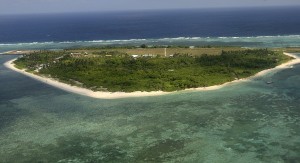Proceedings on PH case vs China going much faster – report

Pag-asa Island, part of the disputed Spratly group of islands, in the South China Sea located off the coast of western Philippines AP FILE PHOTO
MANILA, Philippines – The decision of the Arbitral Tribunal on the maritime dispute case between the Philippines and China may come “a lot faster” because of China’s refusal to participate in the proceedings, the Philippines lead counsel said in an interview with a newspaper in the United States.
“Arbitrations under the Law of the Sea Convention have normally taken between three and five years from beginning to end. However, in all those cases, there were two parties fighting it out,” lawyer Paul Reichler said in an exclusive interview with the Wall Street Journal last October 15.
“The proceedings will go a lot faster in this case if China holds to its current position not to actively participate,” he said.
In January 2013, the Philippines initiated arbitration proceedings against China over its claim of “indisputable sovereignty” in nearly the entire South China Sea.
“It is a claim that is expansive, excessive and in gross violation of international law,” del Rosario said in his speech before the members of the Management Association of the Philippines (MAP) Thursday.
Article continues after this advertisement“China’s continuous overwhelming naval and maritime presence in the area is also contributing to the raising of regional tensions,” he said.
Article continues after this advertisementIn a statement last August 27, the Arbitral Tribunal said that the Permanent Court of Arbitration shall act as the registry in the proceedings and ordered the Philippines to submit its Memorial, or position and arguments, by March 30, 2014.
“The Arbitral Tribunal directs the Philippines to fully address all issues, including matters relating to the jurisdiction of the Arbitral Tribunal, the admissibility of the Philippines’ claim, as well as the merits of the dispute,” it said.
China had previously sent a formal letter to the Arbitral Tribunal stating that it does not accept the arbitration proceedings and will not participate.
Reichler said that, in the absence of China’s position, the Tribunal will likely think of possible arguments China might have which the Philippines will still have to respond to.
“I imagine that, after reading our memorial, the members of the Tribunal will place themselves in China’s position and try to identify counter-arguments China might have made, and then give us a chance to address these hypothetical counter-arguments as well as any questions the members of the tribunal might have,” he said.
“I think the post-memorial process could take anywhere from six to 12 months [bringing us to] somewhere between April and October 2014 for the completion of the case,” Reichler added.
Del Rosario expressed hope that the case would be completed within Aquino’s term.
“Our hope is that [the decision] will come down while the president is still in office,” he said. “The decision of the Arbitral Tribunal will be legally binding on all parties and will not be appealable.”
“Arbitration will clarify what is ours, specifically our fishing rights, rights to resources and rights to enforce laws within our Exclusive Economic Zone. For the rest of the international community, the clarification of maritime entitlements will assure peace, security, stability and freedom of navigation in the South China Sea,” he said.
Several Southeast Asian countries, including Vietnam, Malaysia, Indonesia, Brunei, and Taiwan, also have claims in the region.
Related stories
Arbitral tribunal hearing on PH case vs China kicks off
PH takes China to UN arbitral tribunal
For comprehensive coverage, in-depth analysis, visit our special page for West Philippine Sea updates. Stay informed with articles, videos, and expert opinions.